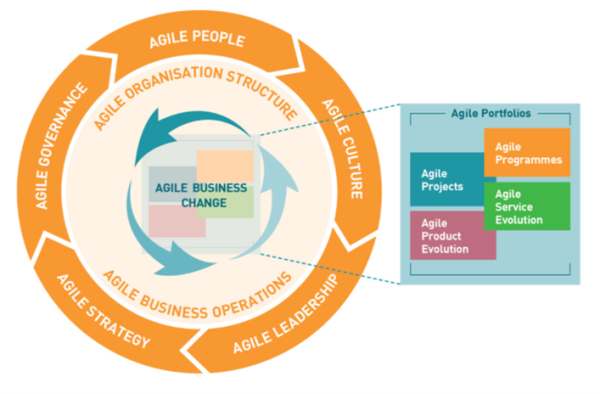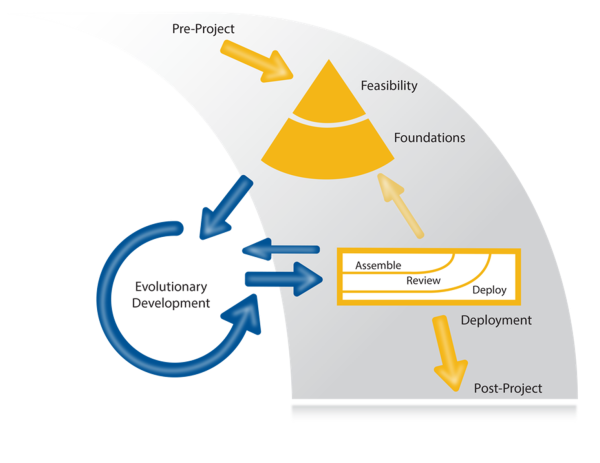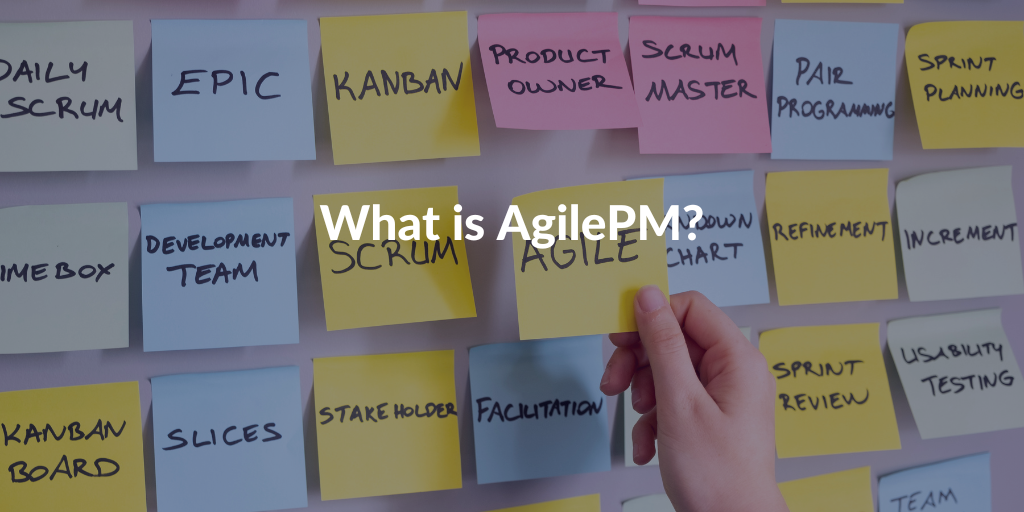AgilePM is a Project Management Method that consists of an innovative approach. The method aims to combine the governance and rigor necessary for project management with the agility and flexibility necessary for organisations to adapt to constant changes.
In this article we will delve into the key elements of the method and explain its basic concepts.
Becoming Agile: The framework for Business Agility
The AgilePM framework illustrates the elements necessary to make an organisation truly Agile so that it can become more adaptive, creative and resilient.
The Agile Business Consortium structured the framework in such a way that it can help organisations to adopt the concept of Business Agility making them able to:
- Quickly adapt to market changes – both internal and external
- Respond quickly and flexibly to customer inquiries
- Adapt and drive change productively and economically without compromising product quality
- Always have a competitive advantage

Source: Agile Business Consortium
Who is Agile Project Management for?
AgilePM is a certification suitable for both individual professionals looking to include more agility in their daily work, but also for bigger organisations.
The AgilePM framework is suitable for professionals who want to adopt a flexible and collaborative project management approach by improving:
- the Standard
- the Quality
- the Delivery Speed
AgilePM is adaptable to all organisations that are looking for an Agile approach to integrate with their own structure, while continuing to follow the standards, rigor and visibility typical of project management. The AgilePM methodology can be applied integrating particular organisational processes with the speed of change guaranteed by the Agile Method.
AgilePM Benefits
- Flexibility: AgilePM allows you to increase flexibility both in terms of the product and the process. If the goal is to improve quality, AgilePM sets no limits to change.
- Transparency and accountability: If all members are responsible for the process and can see updates at each stage of development, the work will proceed with greater transparency. This leads to all professionals being more involved and motivated to achieve their goals.
- Problem solving: If all team members are involved and up to date, they also manage to achieve deeper skills and knowledge. This will allow each professional to solve problems independently.
- Less chance of error: The division of work into small steps allows for regular checks. This pushes to create a culture of responsibility in which every team member will feel involved.
Lifecycle in AgilePM
AgilePM is the only framework that considers the life cycle of a project going beyond the scope of development. The Agile Business Consortium argues that every project should be aligned to clearly define strategic objectives and thus have the opportunity to focus on achieving anticipated benefits.
The “anticipated benefits” are extremely important as an Agile Method should be able to bring benefits to the company earlier than a traditional approach. For this reason, the lifecycle defined in AgilePM begins with the Pre-Project phase, thus being able to start earlier and reach the benefits faster.

Source: APMG International
The Project Phases in Agile Project Managementt are:
- Pre-Project Phase: defining that the project is coherent and set correctly
- Feasibility Phase: examining the cost-benefit ratio of the project
- Foundations Phase: creating a solid foundation for the project (e.g. high-level planning)
- Deployment Phase: sending the product into production
- Post-Project Phase: evaluating the business benefits of the project
The process shows the framework and possible options; each project draws its lifecycle directly from this same process.
The framework includes several options available for the evolution of the project: from a linear path that starts with the Pre-Project phase and ends with the Post-Project phase to more complex paths that require repeated steps through some phases.
According to this structure, the project is divided into short periods of time with deadlines that cannot be extended. The lifecycle is defined from the embryonic stages of the process and its structure depends on elements peculiar to each individual situation.
AgilePM Certification Scheme
The AgilePM training course is divided into two modules:
- AgilePM Foundation
- AgilePM Practitioner
AgilePM Foundation
The AgilePM Foundation course is aimed at all Project Managers and professionals who want to adopt an Agile Method and aims to teach candidates the philosophy, principles, processes, products and techniques of AgilePM.
The exam consists of 50 multiple choice questions and lasts 40 minutes. We have explored the methods and types of questions in this article.
AgilePM Practitioner
The AgilePM Practitioner certification aims to establish whether candidates have sufficient knowledge of the Agile Project Management guide to be able to apply them to a given scenario.
The exam, which can only be accessed if already in possession of the AgilePM Foundation certification, takes place in 150 minutes and consists of 4 questions with a value of 20 points each.
How to get an AgilePM Certification
In order to obtain your AgilePM certification you must follow an AgilePM course with an ATO, or an APMG Accredited Training Organisation.
QRP International is an ATO for AgilePM. We are accredited by APMG and can provide AgilePM Foundation and AgilePM Practitioner training. For more information, visit our website or contact us directly.










